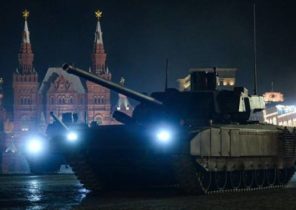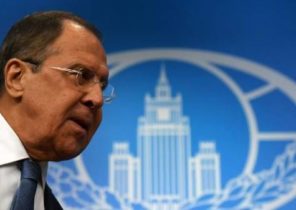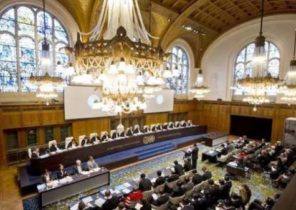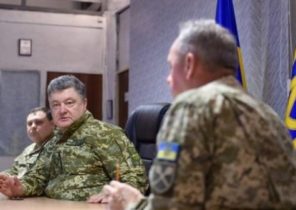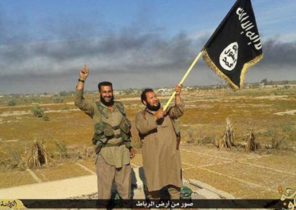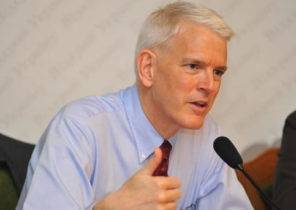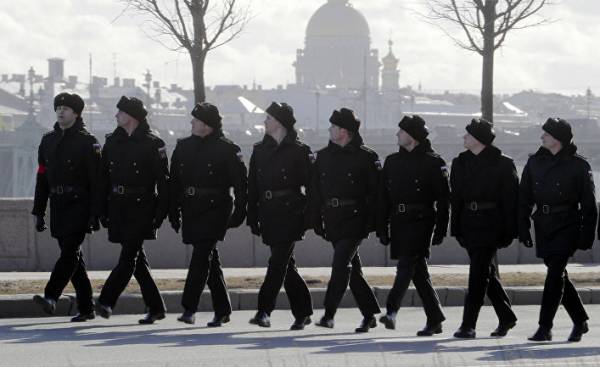
“While America is dreaming a dream about the future, and the same thing is starting to make China, Russia refers to what has already been. And this is the path of self-destruction,” — says political geographer Michael Romantsov.
— DenníkN: you Recently said that Russia itself was destroyed. What do you mean?
— Michael Romantsov: First of all I meant that Russia — a huge state, which has long had some of the attributes characteristic of power. She has a vast territory, the population, albeit drastically reduced, large, and besides, Russia has a huge nuclear Arsenal, which allows it to destroy the planet. Objectively there are many attributes of power, but Russia has little to offer the world, in addition to the above. Russia is not able to keep up with the rest in terms of quality. And with that the Russian regime began to fight in their own way. In foreign policy he is acting aggressively, although not pursuing a great purpose — to capture new territories. Rather, it is to ensure that those inside were afraid of the world outside, and all his attention turned to domestic Affairs. The question that should be directed to their attention. They appeal to the 70-year history (almost 75 years) and even a century ago. Russia — the state that lives by its heroic past and completely unaware of how this monstrously distorted image of the past. While America is dreaming a dream about the future, and the same thing is starting to make China, Russia refers to what has already been. And this is the path of self-destruction.
— When did this start? So in Russia was always, or is there still existed a certain vision of the future?
— In the past this has happened several times already, because one of the important ideas in Russia and at the same time stereotype is the idea that this country is exceptional. It all started in the days when there was a single Orthodox state that no one is dependent, while all the rest were under the Muslims, who under the Western Christians. Then this idea was widespread under the Bolsheviks, but with them in the first place was the prospect of the world revolution, which was promoted by Lenin. There was relatively new, and for certain circles potentially support the idea of the Russian world. But its spread was limited.
But it was the idea of a Eurasian Union, which was to include European and Central Asian countries.
— Of course, it is. If you remember how the Union was declared, it was clear: there was supposed to be integration on the same principles as in the European Union, that is, it was about the free movement of persons, labour and capital. But look, as is the case in reality: many of the original ideas were forgotten, and the Union becomes a Union of countries, among which naturally and inevitably dominated by Russia. This is similar to the asymmetric relationship, and if there is a serious problem, solve it no one will. Remember the Commonwealth of Independent States or anything else that arose in the post-Soviet space. When there was some problem, integrated community, it is not solved. I’m afraid, despite the fact that the Eurasian Union is very long, it will not give other results.
— You say that military aggression is designed for the domestic audience. Can she continue?
— I think that may be because in the vicinity of the Russian border regions are inhabited by ethnic Russians. But “can” does not mean that necessarily will be. In my opinion, the Russian regime is to some extent already exhausted the possibilities of military aggression. After the Crimea for some time it seemed that Russian tanks stopped only somewhere in Berlin. But I guess the disillusionment has already arrived. Even now, Eastern Ukraine seems like a huge problem, so I don’t think in the near future the Russians were able and were willing to create new problems. Thus, we do not expect further escalation of tensions. Russia’s ability to create something positive is very limited, but it has an almost unlimited ability to disrupt the course of things, to split, and so on. This is illustrated by the example of Transnistria, on the example of the Russian minority in the Baltic States and other regions. All this gives Russia the opportunity to influence the situation in other countries, and probably the Russians and it is limited.
— Does this impact on extremist parties in Europe?
— I think so, but in contrast to the period when there was the Communist international, or Comintern, today Russian has no potential to create close to your party and unions, who went to Moscow…
— To learn to turn off the neck of all the rest of the house?
— So. In Russian there is no such potential, but they are able to find and support anyone — whether it is left, right or centrist — who can currently undermine one or another European, or rather Western state. The Russian will use this system as an open buffet. As soon as appear some forces, they will support them: some financial, some intercession, and some advertising. And for today it is enough.
— And do not You think sometimes all of this information, which often is just unconfirmed speculation on the topic of Russian influence in different events, just a conspiracy theory?
— Of course, to a certain extent, the problem is exaggerated because the situation is largely opaque, but the conspiracy theories in pure no. Regarding opacity, I will add something. Formally, Russia is a semi-presidential system. Formally Russia is a Federation. But looking how this system works in practice, you will understand that, as in Soviet times, on paper is one thing, but in reality, the mode functions completely differently. However, the situation is not the same which was from the 50s to the 80s years of the last century: then only the photos from the rostrum of the Mausoleum was tried, who has influence and who is not. Today more information. But it is important that, firstly, no information, reliability of which would be irrefutable, and secondly, we cannot be sure that the decision taken in Russia, will be implemented in practice. Because this system works not in accordance with what is written, and according to what he wants man standing at the head, that is Vladimir Putin.
— Can we speak of him as an autocrat or not?
— Is the question. In Russia there is a government, which is headed by the Chairman. We have transcripts and videos of how the Russian government is discussing the issues in the discussion involved the President, as debate and so on. But, in addition, there is a very powerful organ, which is beginning to remind me of the old Politburo. I’m talking about the security Council of the Russian Federation, which works in wide and narrow format. The range of issues with which it deals, the more, the wider. Of course, there’s a reason, after all, the problem of food security is related to security. But these topics are becoming more security dimension to find even where a few years ago it was not. It seems that the security Council is beginning to have an increasing impact on Russian society. This is confirmed by the appearance of forces of the Russian National guard.
— What is the Russian national guard?
Suddenly inside the already large security apparatus there was a special education, which reports only to the President. We are talking about a few thousand fighters with different types of weapons. People naturally wonder why the guard is, what it is, what it looks like, and therefore, analogies with the Praetorian guard, the SA and SS. What is happening is far from written, and although the process can be observed, all covered with darkness. Since we are on the Russian, who understand how great impact on the functioning of the state has a story to interpret events, we call that logical, to historical analogies.
And how do you explain this?
— I think that in relations with the West, the regime had exhausted its legitimacy, attacking the Ukraine. Putin had long forgiven much, because in the West sounded the rhetoric that Russia is a great and it has its own specifics. But Russia lost their capital. The legitimacy of the regime is exhausted, not only because of sanctions and falling oil prices, but primarily because of the crazy corruption, which is based on this mode. The social contract within the country itself is becoming obsolete.
— A few weeks ago, in cities across Russia held demonstrations against corruption, which was attended by many young people, born after the collapse of the Soviet Union. These demonstrations seem to differ from performances in 2011-2012.
— I am extremely interested in that if five years ago, the protests were primarily political, and they organized a group of citizens, fed up with the way the government is treating them, which simply falsified the elections, this time the theme of the protests was “apolitical” corruption. That is a legitimate issue, because of corruption, says Putin. Corruption has two forms: moral, which is closely related to electoral fraud and economic-financial. But in such demonstrations it was impossible to distinguish between who is against any corruption protests. They came out young, even underage people. Perhaps those are right who say that Putin’s social contract with its own citizens obsolete. This contract was based on two things. First, in spite of unimaginable corruption, and overall increased well-being, but that’s not happening. Secondly, people kept dormant through national channels. However, those who came to protest, not watching TV. These people live in a different world from the world of the majority. And the state has much less features (maybe even zero) to influence them and manipulate them. We have to see will there be any further restrictions on the Internet.
— The Kremlin never lost one election or referendum. Can this ever happen?
— No, at least while in Russia there will be no such election, they know what we. Speaking about Russia, we use the term “elections”, but there never was. There has always been an incredible fraud. What is happening there, we called the election because I want to add to the Kremlin’s legitimacy, or because we have no other words. In Russia there are a lot of things that we and they are called the same, but are fundamentally different. They say that they have held elections, but this is not an election and the submission of that election, and just think that there is some external attributes. But their elections are not free, not competitive and not fair. If Russia held such an election, I don’t know what they would have ended, but certainly, United Russia would not receive a constitutional majority. Even just uttering the word “election”, we are putting ourselves in a strange position. We turn them into a normal state, despite the fact that Russia is not.
— As for the demonstrations of 2011-2012, the leaders came to a bad end. Dead Nemtsov, Udaltsov — behind bars, Navalny was constantly harassed. If there is someone else who can speak out against the Putin regime?
It’s a big question. It is possible that such a person will appear in a different environment. In Czechoslovakia knew that there was some Havel, but no one knew what he looks like, says and thinks. And who knew Vaclav Klaus? No. In the end, he became one of the leaders of transformation processes. Given that Russia is home to more than 140 million people, there could certainly be someone, but we don’t know it yet. Those who today acts of Russia against the regime, unable to subdue his ego. There are many generals but not enough soldiers. Things can change if you change the form of protests. For this it is necessary to have a relevant topic that will make the streets a sufficient number of people. In 2011-2012, the protests took place mainly in the large cities, but now, as we have seen, the speech covered and the smaller cities, because the issue of corruption is a great response in the society. Also, much will depend on how the state government will deal with protesters.
— How after three years you appreciate the occupation of the Crimea? Whether it was a brief episode, or talking about strategy?
— I think it is necessary to distinguish two things. First, it was a professional, planned and well-conducted operation. The military had a well-developed plan of action, which they held, which confirms that the Russian General staff are professionals able to prepare such a plan. But there is also much more important things relating to politics. The more we move away from the operation in time, the clearer that there was no brilliant strategic move was not — it was just tactical and, perhaps, foolish decision. I firmly believe that Putin acted in a state of extreme stress that he was frightened by the events on the Maidan. Like he’s afraid as hell of incense. When it became clear that his people in Ukraine can not cope, Putin stressed reacted.
— If the occupation of Crimea was carried out professionally, then what about Eastern Ukraine?
Eastern Ukraine is another matter, although there is thought that the Crimean scenario will repeat itself. But for the moment Ukraine has already recovered from the shock, and hence the surprise factor played a smaller role. Secondly, the Crimean Peninsula, where nature itself took care of certain clear limitations. In Crimea, specifically in Sevastopol was a Russian garrison, while in Eastern Ukraine it was necessary to penetrate into a region which was opened to the rest of Ukraine. In contrast to the Crimea, where in fact no resistance was felt, but very soon everything changed with the exact opposite. Let Putin and pretended that he has nothing to do with it, he had the soldiers the support that would help them cope with the situation.
— Why do we need them Russian soldiers in the Crimea, in the Donbass, in South Ossetia, Abkhazia and Transnistria?
— I think that it is generally not necessary. All the talk about the fact that in the Crimea was supposed to be a NATO base and so on — is nonsense, as the words of Russian that would deprive Crimean base. They say that nuclear weapons make them a world power. Russia does not need neither of these regions, but all of those points are still in the 90 years allowed Russia to play a relatively small space the same role the United States plays in the world. The Russians have stated that they are peacekeepers in these conflict zones. They wanted to show that even huddled in the borders, is able to play such a role. In this connection it is interesting, as Russians themselves say about their armed forces. They claim that they never waged offensive wars, but if you realize how Russia is a huge state, such statements seem obvious nonsense. The Russians say that their soldiers were liberators (in the wars with Napoleon and Hitler), and then the internationalists in 1968 in Czechoslovakia and Afghanistan. In the 90 years they were peacekeepers, and now they are almost a humanitarian mission. Russians are very able to create a pretty picture, but the reality is quite different.
— Who believes it?
— First of all, believe that people in the country. If you refer to the posters during the Second world war, you’d see the red army that bayonets driven the Nazis. And in the distance is Alexander Nevsky, who is fighting with the enemy on lake Peipsi. Slogans such as “Thank you grandpa for the victory”, is still alive in the public consciousness. In 1945 there still remember, and are actively using it. Related to this is the fact that Ukraine suddenly had millions of Nazis, which before was not there. But such trust and abroad. Someone- because hates the United States, someone- because the Russophile and someone — because you idiot, and so on.
— Is Russia going to revive the Empire?
— There is no doubt that there are people who dream about the Russian Empire back in the game. Dugin, in this sense, is not alone. Realists do not dream of the revival of the Empire, but we want Russia to play an important role, it is a matter, rather, not in the status of Empire, and influence.
— What is political geography?
This discipline describes how spatial parameters influence on policy. Any state can be analyzed, evaluating its administrative structure. All countries can be divided into single and compound. In the case of the latter, we distinguish between Federation and Confederation. If it’s a Federation, it is possible to determine it symmetrical or asymmetrical, and so on. Also, States are categorised. Geopolitics is an analytical method by which the distribution of power in space, as it is now, and as it was in the past. Examines the attributes that have played an important role for the realization of the authorities that contributed to its retention and Vice versa.
— That from this point of view one can say about Central Europe?
— Central Europe, no luck. When Europeans learned to sail long distances, of the state located on the Atlantic periphery, opened territory, which could expand. These areas were so large that a small Portugal have managed to leave their mark in Brazil, Angola, Mozambique, Goa, India and Macau, China. This is due to the ability to go beyond the horizon, somewhere to go, and there to expand. Russia, countries on the Eastern periphery of Europe, was also a huge, almost infinite space through which she could expand. The Russian crossed the Urals and over the next 70 years reached the Pacific ocean, which on the other hand approached Western European countries. Central Europe is lucky in that it was between these two peripheries. In the end the government managed to keep the two entities. Of the small States of the Habsburg in the Swiss-German border turned out great Habsburg Empire and then Austria-Hungary. In the North, perhaps even more successfully, from the original small great of Prussia was born in Germany. Poland, which for several centuries it was all good, as these States eventually did not survive these large-scale transformations and were separated. Germany two times I wanted to break those shackles and to become a Central world power. When success seemed near, the case ended in a huge loss. From this it follows that if Central Europe will not be part of integrated Europe, it will remain with those limitations that nothing can be done.
— Does this mean that if we are not in the EU or at its periphery, we will inevitably become the periphery of Russia?
— No, but attempts will be made incredible. Of course, you can function independently, but this requires favorable conditions. Independently, we are unable to create them, and I doubt someone else has created them for us. But there is the European Union, which makes possible the coexistence of large and small States without any competition.
— However, for example, the planned gas pipeline “Nord stream — 2″, which will connect Russia with Germany under the Baltic sea.
The poles spoke harshly, calling the project with the Molotov — Ribbentrop Pact two. And really, good enough. Of course, the question is how much this project public, and how much is hidden. We know that had been open debate, and, apparently, there are no secret agreements do not exist. The project we may not like it, but we know what we are, and can work with that. It would be best to raise all the political issues that can threaten us on the Central European level. For example, it is possible to discuss energy policy or the protection of the external borders. Now we may speak, but our opinion is not necessarily taken into account. Nothing will change, because we have no capacity, which could make us more serious players. We don’t have enough population, weapons, territory. Whether we like it or not, but I have listed some of the few constants that in international relations you can rely. And this is just the European context. On a global scale, the Czech Republic, with its ten million citizens represents about 0.14% of the world population, and Slovakia — two times less. None of us in private life not even paying attention to that significantly by 0.14%. Nobody will notice. Europe without the UK is still about 450 million people that still has a certain weight. Plus remember how rich and educated this population. But if we split up… Look at the largest country of the European Union — Germany: 80 million population will then become just one per cent of the population, and this kind of subject you can simply ignore.
— Can Europe return to spheres of influence? I mean abroad.
— Can. After all, what is the European neighbourhood policy, if not an attempt by the European Union to dissociate the territory, which, as suggested by the EU, the Union may offer something positive. This problem should not be considered from a regulatory point of view. Zone of influence — part of international relations.
— But many European Nations still are blamed, for example, during colonialism.
— At different times in different parts of the world Europeans are the cause of certain disasters. But the conversation should be over. If we do not want to die in a world that is clearly moving towards the confrontational period, we must cope with the competition. Of course, we must realize our mistakes and miscalculations, but also need to understand that others at the same time or a little later — had done wrong. Of course, the European slave trade should be criticized, but at the same time the slaves were sold and in the Accident, and in India, and so on.
— You mentioned the size of territory. Probably, it is not only in square kilometers, but in natural conditions, right?
— Of course. Important and population. If we take into account only one attribute, you’ll soon come to a standstill. This is well illustrated by the example of China. When Mao came to power, began to think of the Bolsheviks that all it want to attack, and therefore warned against it. Once, he even allegedly said that if the Chinese army put in six rows, each is for a million people. They went to the sea and drowned like kittens. And still the Chinese will be the same. There were many Chinese, but when six million soldiers — only a million guns, and each guns — only three shells, and each fourth soldier — only one Shoe, it turns out that there is quantity but no quality. If someone wants to play an important role in the world, the quality and quantity must somehow reasonable to relate to. On the other hand, there is a small extremely rich state, able to provide superior quality weapons. Today Singapore is a significant power actor in the region, but in one-on-one clash with modern China as it will not help.
— Can it happen that after some time there will be other major world powers?
— Yes, it can be, but it is a very slow process. To some, the state quickly became a power, it must in a short time is incredibly rich, or have to have some kind of fracture. If, for example, Liechtenstein has invented a laser weapon that could destroy all, then Yes. But if nothing like this happens, the process is gradual, and those countries where there is more population, there will always be more successful than small States. So it makes sense to consider Brazil. If we turn to Africa, there is, for example, Nigeria, with 140 million people, but it is so poorly managed that power it won’t work. By 2050 Bangladesh will live a quarter of a billion people, but they live in such conditions that the population growth there is likely harm.
